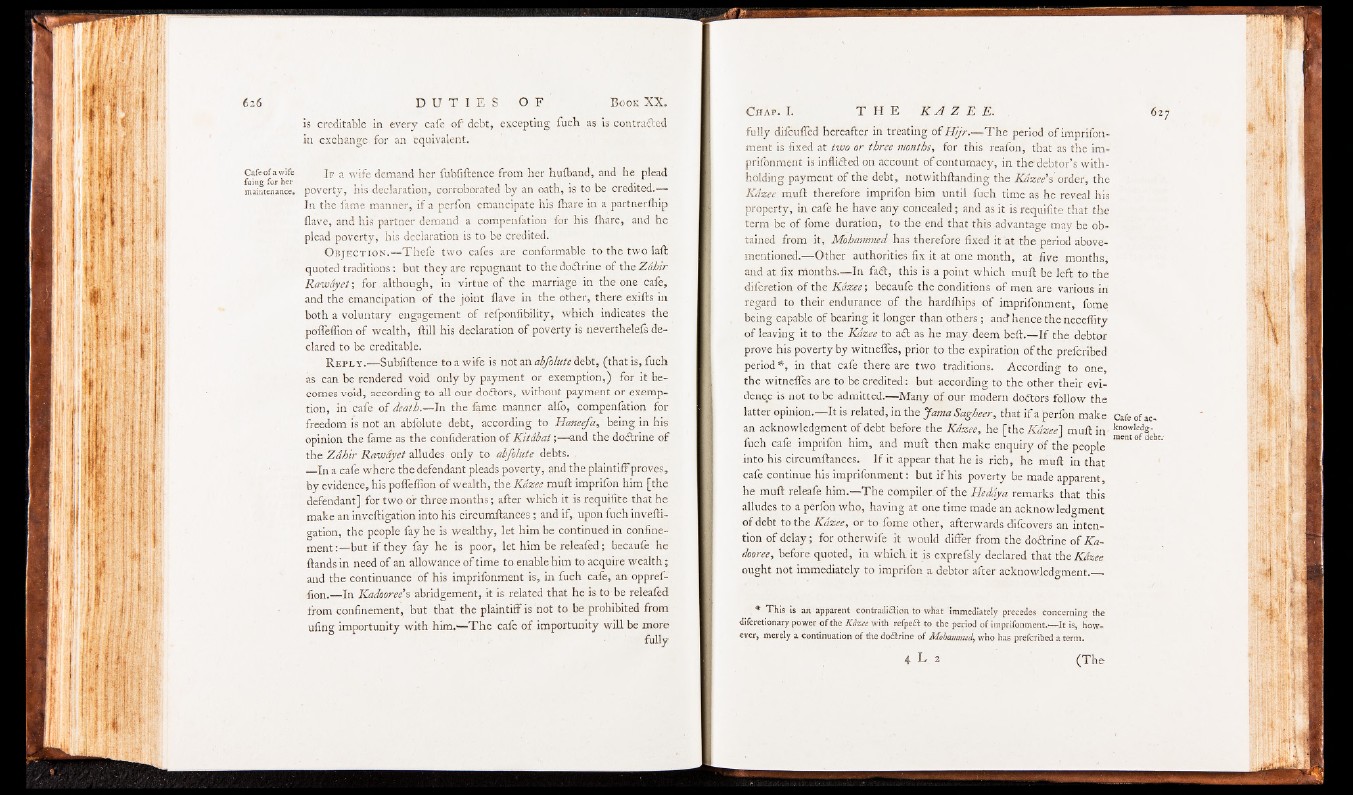
Cafe of a wife
filing for her
maintenance.
is creditable in every cafe o f debt, excepting fuch as is contraftecl
in exchange for an equivalent.
If a wife demand her fubfidence from her hulband, and he plead
poverty, his declaration, corroborated by an oath, is to be credited.—
In the fame manner, if a perfon emancipate his (hare in a partnerfhip
Have, and his partner demand a compenfation for his (hare, and he
plead poverty, his declaration is to be credited.
Objection.—Thefe two cafes are conformable to the two lad
quoted traditions: but they are repugnant to the doftrine of the Zdbir
Rawdyet', for- although, in virtue of the marriage in the one cafe,
and the emancipation of the joint (lave in the other, there exids in
both a voluntary engagement of refponfibility, which indicates the
poffeffion of wealth, dill his declaration of poverty is neverthelefs declared
to be creditable.
R e p l y .— Subfidence to a wife is not an abjolute debt, (that is, fuch
as can be rendered void only by payment or exemption,) for it becomes
void, according to all our doctors, without payment or exemption,
in cafe of death.— In the fame manner alfo, compenfation for
freedom is not an abfolute debt, according to Haneefa, being in his
opinion the fame as the confideration of Kitdbai;— and the dodtrine of
the Zdhir Rawdyet alludes only to abfolute debts. .
—In a cafe where the defendant pleads poverty, and the plaintiff proves,
by evidence, his poffeffion of wealth, the Kdzee mud imprifon him [the
defendant] for two of three months; after which it is requifite that he
make an invedigation into his cireumdances; and if, upon fuch invedi-
gation, the people fay he is wealthy, let him be continued in confineme
n t b u t if they fay he is poor, let him be releafed; becaufe he
dandsin need of an allowance of time to enable him to acquire wealth ;
and the continuance of his imprifonment is, in fuch cafe, an oppref-
fion.— ln Kadooree's abridgement, it is related that he is to be releafed
from confinement , but that the plaintiff is not to be prohibited from
ufing importunity with him.—T h e cafe of importunity will be more
C h a p . I . T H E R A Z E E . 627
fully difcuffed hereafter in treating of Hijr.—-The period of imprifonment
is fixed at two or three months, for this reafbn, that as the imprifonment
is indicated on account of contumacy, in the'debtor’s withholding
payment of the debt, notwithdanding the Kdzee's order, the
Kdzee. mud therefore imprifon him until fuch time as he reveal his
property, in cafe he have any concealed; and as it is requifite that the
term be of fome duration, to the end that this advantage may be obtained
from it, Mohammed has therefore fixed it at the period above-
mentioned.— Other authorities fix it at one month, at five months
and at fix months.— In fadt, this is a point which mud be left to the
difcretion of the Kdzee', becaufe the conditions of men are various in
regard to their endurance of the hardfhips of imprifonment, fome
being capable of bearing it longer than others ; and hence the neceffity
of leaving it to the Kdzee to adt as he may. deem bed.—I f the debtor
prove his poverty by witneffes, prior to the expiration of the prefcribed
period*, in that cafe there are two traditions. According to one,
the witneffes are to be credited: but according to the other their evidence
is not to be admitted.— Many of our modern dodtors follow the
latter opinion.— It is related, in the Jama Sagheer, that if a perfon make Cafe of ac-
an acknowledgment of debt before the Kdzee, he [the Kdzee] mud in' kn0','IedS-
djch cafe imprifon him, and mud then make enquiry of the people
into his cireumdances. I f it appear that he is rich, he mud in that
cafe continue his imprifonment: but if his- poverty be made apparent,
he mud releafe him.— The compiler of the Heddya remarks that this
alludes to a perfon who, having at one time made an acknowledgment
of debt to the Kdzee, or to fome other, afterwards difeovers an intention
of delay; forotherwife it would differ from the dodtrine of Kadooree,
before quoted, in which, it is exprefsly declared that the Kdzee
ought not immediately to imprifon a debtor after acknowledgment._
* T h is is an apparent contradiction to what immediately precedes concerning the
diferetionary power o f the Kdzee with re fp e t to the period of imprifonment.-—I t is, however,
merely a continuation o f the d o t r in e o f Mohammed, who has prefcribed a term.
4 L 2 (The